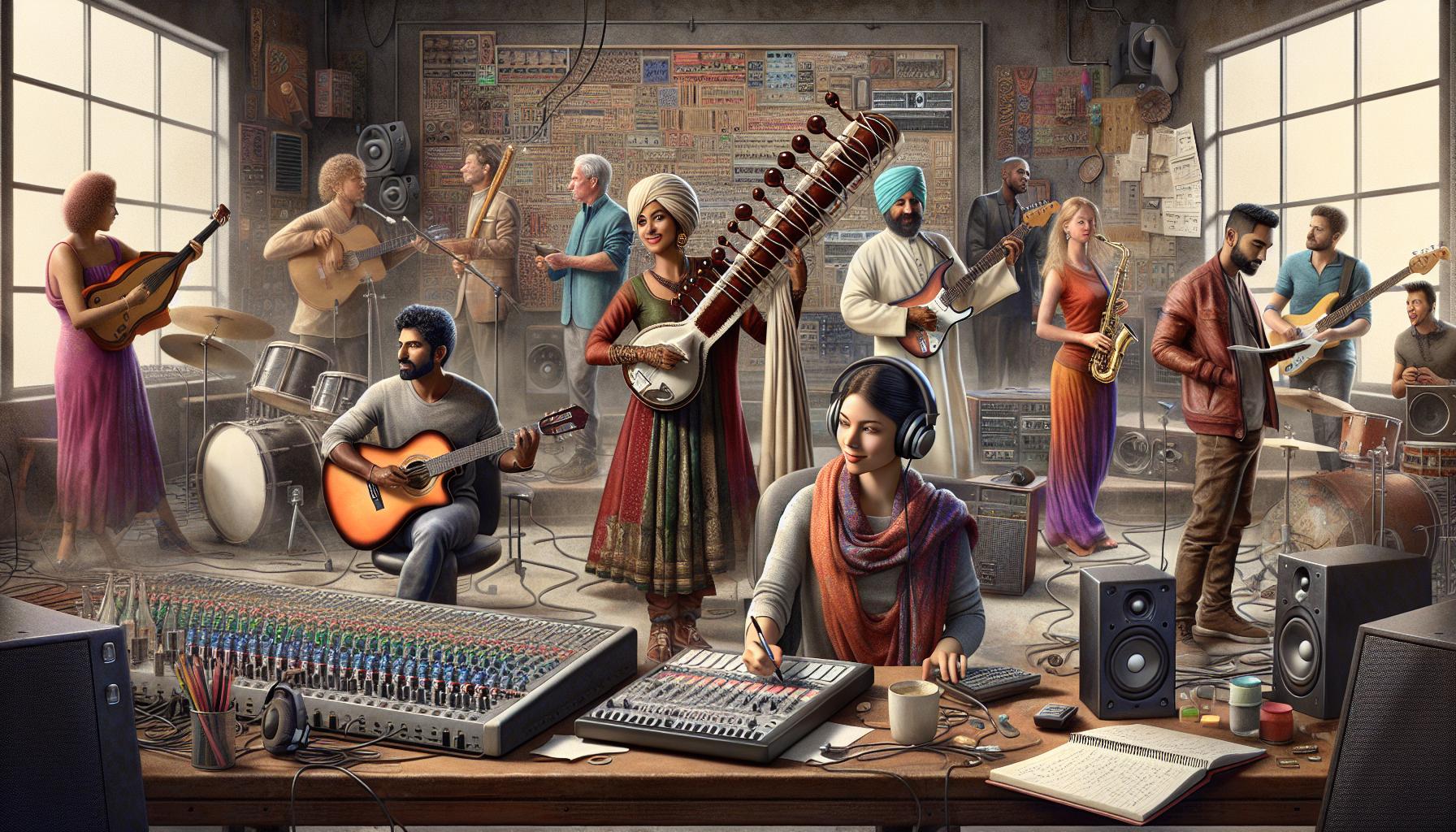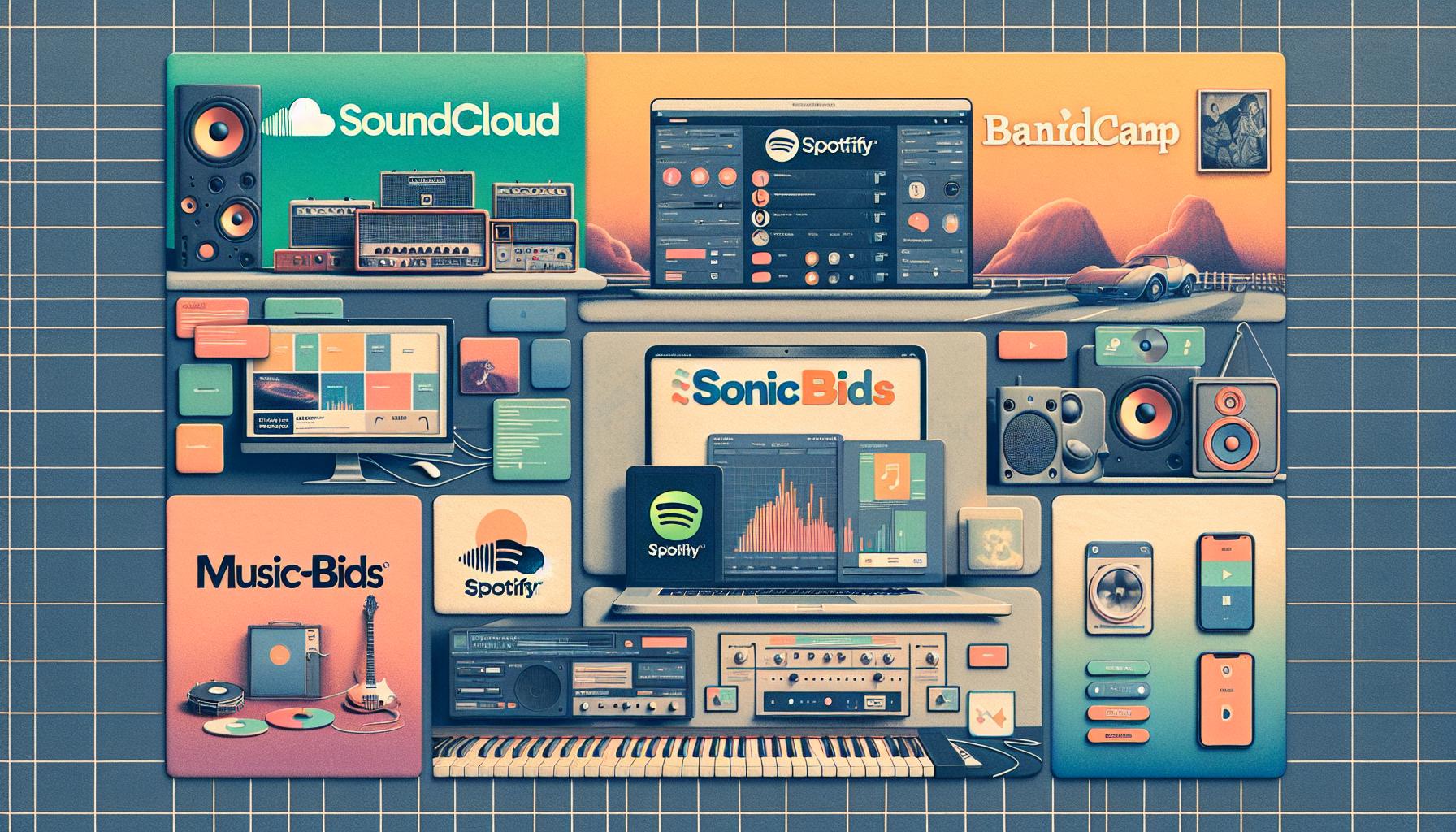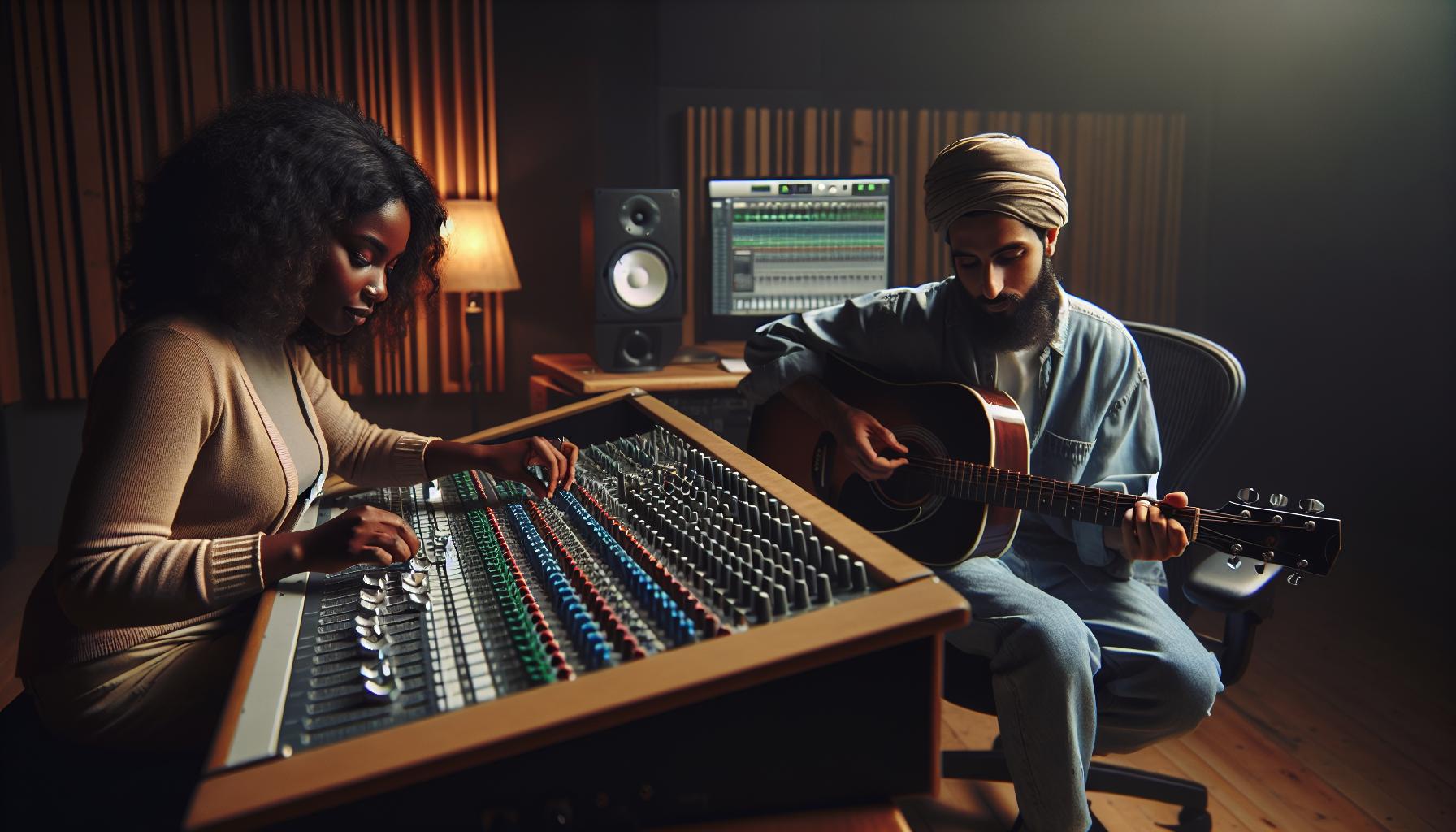As a musician, I’ve learned firsthand that it’s not just about the music. It’s also about who you know. Networking is a crucial part of building a successful career in music. It’s about creating meaningful connections that can open doors to opportunities you might not have found otherwise.
In this digital age, networking has become even more critical. With a plethora of online platforms, musicians can connect with industry professionals, fellow artists, and fans from all over the world. It’s not just about shaking hands at gigs anymore – it’s about nurturing relationships and building a community around your music.
In this article, we’ll dive into the importance of networking for musicians, and I’ll share some practical tips on how to build meaningful connections. Whether you’re an aspiring artist or a seasoned pro, you’ll find value in expanding your network.
Contents
Why Networking Is Crucial for Musicians
As an experienced player in the music industry, I cannot emphasize enough how vital networking extends beyond mere socialization. We’re looking at a promotional goldmine here, a fundamental building block for success in music.
Let’s start by analyzing the foundation. Basically, music is community-oriented. Artists and fans come together to celebrate, communicate, and connect over shared feelings. You see, an artist isn’t just another person producing sound anymore. They are a storyteller, a mood lifter, a party starter, or even a soul soother.
There’s also the business aspect where connections really matter. It’s a global arena where the competition is fierce. Networking works as your ticket to opportunities, allowing you to stay ahead of the game.
Imagine this scenario. You’ve put your heart and soul into an upcoming album. You’ve labored on every note, chord, and lyric. But then, you hit a wall when it comes to distribution, marketing, and exposure. This is where having a network can turn the tables. Through a contact at a record label, a well-connected promoter, or a successful fellow artist, you can get your masterpiece to reach the right ears.
The value of networking isn’t just in leveraging opportunities but also in sparking creativity. Remember the saying that “Iron sharpens iron”? Collaborations can birth incredible compositions. They provide fresh perspectives, techniques, and ideas I might not have thought of alone. Some of the greatest hits known were born out of collaborations.
Platforms such as Twitter, LinkedIn, Bandcamp, and SoundCloud have eased the path to nurt keep ing and building connections. It’s now easier for artists to reach out and connect with professionals, peers, and fan bases worldwide. As an artist, there’s no telling what possibilities can open up once you begin connecting actively. One thing is for sure: a robust network is an artist’s power tool.
You might be wondering, how do I, as an artist, build valuable connections? Well, let’s dive into understanding how to network effectively to get the most from my connections. This will not be a smooth journey, but it’s definitely a rewarding one. So, get ready to start pushing your comfort zone.
The Benefits of Building Meaningful Connections

Building meaningful connections in the music industry isn’t just about making friends — it can profoundly influence an artist’s career trajectory. When we peel back the surface, what do we find at the core of these benefits?
Initially, opportunity generation is a significant driver. A robust network can open doors otherwise closed. It’s not what you know, but who you know, right? Consider this: It’s probably because of a connection that a band lands a slot at a prominent music festival, or an emerging artist gets a chance to work with a world-class producer.
Then, there’s the aspect of learning and development. Successful musicians aren’t made overnight. It takes years of practice, honing your craft, learning the ropes of the industry. Who better to learn from than peers, mentors, industry professionals who’ve walked the path you’re embarking on? Learning and insight garnered from networking cannot be understated.
Moreover, collaborative efforts many times birth new ideas and innovations. Working with others introduces different creative processes, new perspectives, and can elevate your music to previously unimagined heights. Mere communication can spark the flame of creativity, and in the music world, collaboration is key.
Lastly, artists need a receptive audience for their work — where’s the thrill otherwise? Networking is a gateway to gaining exposure, building your fan base. It can lead to increased distribution and marketing opportunities. Meaningful connections can assist artists in bridging the gap between obscurity and recognition.
The following table provides a breakdown of the benefits:
| Benefits of Networking | Description |
|---|---|
| Opportunity Generation | Opens doors to new opportunities |
| Learning and Development | Provides insight from industry professionals |
| Collaboration | Introduces new ideas and perspectives |
| Increased Exposure | Helps build a fan base and expands marketing potential |
Think about it. Networking in the music industry presents a chance to immerse yourself in a community that shares your passion, opens avenues for growth, and can propel you towards your dreams. It’s a striking blend of learning, growing, and succeeding.
Online Platforms for Networking in the Music Industry

As the digital era takes over, musicians are now expanding their networks beyond physical spaces. They’re venturing into virtual realms through a wide array of online platforms. We’ve got to embrace this shift and understand its dynamic potential. Let’s dive into some of them.
SoundCloud is at the forefront here. Apart from sharing tracks, this platform allows artists to engage in feedback exchange, fostering enduring connections. It’s about more than just music sharing; it’s also a place where collaborations are birthed.
Next up, Bandcamp. It’s a great platform for indie artists looking forward to connecting with fans and other musicians. You get to sell your music here, sure, but that’s not the whole gist. Bandcamp’s interactive features allow musicians to bond with their listeners, giving your music a personal touch.
I can’t leave out Spotify. It’s chiefly a streaming platform, sure, but it’s got networking perks too. With the Spotify for Artists feature, musicians can interact with their audience more intimately, glean feedback, and get on listeners’ radars through curated playlists.
It would be an oversight not to mention networking sites designed specifically for music industry professionals—Sonicbids and MusicXray. These websites connect artists to music industry professionals—booking agents, music supervisors, and record labels. These websites make it easier for artists to apply for music opportunities, receive feedback on their work, and even land recording contracts.
Let’s look at these platforms in a bit more detail:
| Platform | Purpose |
|---|---|
| SoundCloud | Sharing, Feedback, Collaboration |
| Bandcamp | Connect with Fans, Sell Music |
| Spotify | Stream Music, Listener Engagement |
| Sonicbids, MusicXray | Network with Industry Professionals |
Sure, it’s essential to master these online platforms for networking in the music industry. But remember, these digital tools only supplement, not replace, the need for face-to-face networking. Keep striking the right balance.
Building Relationships with Industry Professionals
Throughout my years in the music industry, I’ve realized the importance of networking with industry veterans. What often sticks out is relationships with industry professionals eventually become game-changers in the pursuit of a successful music career.
So, how does one build these valuable relationships? It starts with a simple step – reaching out. Send a polite, professional email or message through LinkedIn, Twitter, or a platform like SoundCloud. Make sure the message is personalized to the individual recipient; templates are convenient, but they lack the genuine interest needed to really catch someone’s attention.
Connect with these people often, but avoid being overbearing. Common advice is to keep in touch every three to four months. Use these interactions to show interest in their work, share updates about your music, or simply see how they’re doing. These regular touchpoints will gradually create a rapport.
It’s important to attend music industry events – they’re the perfect platforms to meet professionals face-to-face. Such events range from awards shows to conferences and seminars. Although it might seem intimidating, these interactions can prove vastly beneficial for your career. At these events, maintain an approachable demeanor and be ready to engage in conversations.
I should mention that while online platforms offer convenient ways to connect, face-to-face interactions often provide the most meaningful connections. It’s considered the gold standard for fostering relations in the music business. These interactions allow for direct, personal exchanges that are more impactful and memorable.
Remember, networking is a two-way street. Make sure to give as much as you take. From sharing event invites to recommending someone’s work, networking isn’t just about what others can do for you. It’s about building a solid base for a mutually beneficial relationship.
Building relationships is a progression, not a one-time event. With persistence, patience, and genuineness, your networking efforts will prove to be a significant asset in the world of music.
Connecting with Fellow Musicians: Collaboration and Support

Engaging with your fellow artists is a critical aspect of your networking strategy. It’s more than just chit-chat at local gigs or online groups. It’s about forging relationships that can directly impact your career growth. Collaboration is a golden opportunity available through the right networking avenues. Yes, your music is your baby and you’ve probably spent countless hours perfecting your sound. But imagine the magic that could happen when you merge your sounds with another artist’s ideas.
Let’s look at some of the biggest music collaborations: Jay-Z and Alicia Keys with “Empire State of Mind”, Lady Gaga and Bradley Cooper with “Shallow” or Freddie Mercury and David Bowie with “Under Pressure”. Collaborations like these aren’t just about creating a great track. They open up your music to a whole new audience and can wildly broaden your exposure. This kind of opportunity is only possible through sound networking principles.
This doesn’t mean you should sprint to your nearest musician and propose a collaboration. You’ve got to be strategic and authentic. Do your research on the artists you admire. Understand their sound, their journey, and their ethos. Only then, reach out and suggest a joint venture. Platforms like SoundCloud and Bandcamp can be a good starting point for this.
Apart from collaborations, your peer-support network is an unmissable asset. These are the folks who know precisely what you’re going through as an artist. They’ve been on those late-night gigs, they’ve struggled with difficult promoters and they’ve felt the despair when a new track didn’t gain traction. There’s tremendous value in having a community where you can vent, share advice, and support each other. Consider Reddit groups, Facebook groups, or dedicated forums such as MusicXray and Sonicbids to connect and foster these relationships.
In essence, networking with your fellow musicians can be a wellspring of creativity, support, and opportunity. It’s not just about who you know, it’s also about who you grow and create with.
Engaging with Fans and Building a Community
As musicians, we must never underestimate the power of having a dedicated fan base. These are the people who will listen to your new tracks, buy your albums, stream your music and attend your concerts or live performances. They are the backbone of your success, and engaging with them is not just a box-ticking exercise. It’s a way to build a steadfast community that’s tailored to your music and appreciates what you bring to the table.
Building a bond with fans is about more than just responding to comments on your posts or sending out mass thank-you notes. It’s about making them feel heard, appreciated and a part of your journey. You can use live streams on platforms like Instagram, Spotify, or YouTube to interact with them in real-time, answer their queries, or even give them insights or demonstrations of your music-making process.
In the age of digital connection, online platforms also offer a myriad of opportunities to create dedicated communities. Services like Patreon or Bandcamp offer opportunities for fans to financially support their favorite artists in exchange for exclusive content or early access to new music. This not only helps you make a living as an artist but also fosters a deeper bond with your supporters.
It’s also crucial to listen to your fans. Feedback, whether positive or negative, can serve as a guide to understanding their preferences, improving your music, and tailoring your work to your audience’s tastes.
Platforms such as Discord and Facebook provide options to make fan-centric groups where you can converse, share exclusive clips or tracks, and promote new releases. Remember, these communities are an extension of your music. They represent your brand, and managing them responsibly emphasizes your commitment to your fans.
Another key element is collaboration. Collaborating with fans on creative projects can be an innovative way to build deeper connections. Let your fans design merchandise, decide your setlist, or vote on album covers. This signals to them that they play an essential role in your music career.
At the end of the day, it’s about friendship as much as it is about fanhood. Sincere engagement with fans promotes a sense of belonging and enhances their devotion to your music. A loyal, engaged, and passionate fan community goes a long way in driving success in this industry.
Practical Tips for Effective Networking in the Music Industry

As we’ve established, networking is vital for musicians. However, the process can seem daunting, especially for newcomers to the industry. So, I’ll provide some actionable tips that could make networking more effective for you.
First, create a compelling elevator pitch. This is a short, precise presentation that you can use to pitch yourself, whether you’re talking to a potential collaborator, a record label executive or a fan. Include who you are, what you do, your unique selling point, and what you’re seeking. Remember, keep your elevator pitch succinct and engaging.
Next, don’t underestimate the power of social media. With platforms like Facebook, Instagram, Twitter, and LinkedIn, you’ve got a digital universe at your fingertips. Make sure your social media profiles are professional, up-to-date, and active. Regularly share your music, updates about your journey, and engage with your audiences. Use it as a tool for making connections, engaging with fans, and even finding professional opportunities.
Then, network offline. Even in an increasingly digital world, offline networking remains crucial. Attend music industry events, gigs, and meetings. Don’t be shy to approach people and start conversations. Musicians, managers, or even fans you meet there could open doors to unforeseen opportunities.
Lastly, be genuine. Nothing beats authenticity when it comes to building relationships. Show genuine interest in others’ work, offer compliments, or offer constructive criticism. A genuine approach can foster meaningful connections that will sustain your career in the long run.
Conclusion
I’ve stressed the importance of networking for musicians throughout this post. It’s not just about socializing; it’s a crucial success factor in the music industry. Networking can pave the way for opportunities, assist with distribution, marketing, and exposure. Collaborations, sparked by networking, can ignite creativity. Thanks to online platforms, it’s now easier for musicians to connect with industry pros, peers, and fans globally. Remember, the key to effective networking is a compelling elevator pitch, strategic use of social media, offline networking at events, and genuine relationship building. By following these tips, musicians can make networking more effective and sustainable. So, let’s start building those meaningful connections today, and watch how your music career flourishes.
